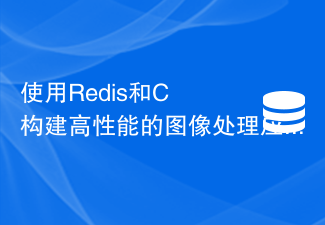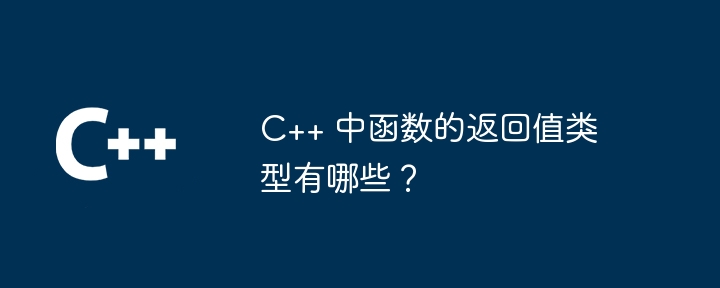 Backend Development
Backend Development C++
C++ The relationship between C++ function return value types and function signatures
The relationship between C++ function return value types and function signaturesIn C, the function return value type is an important part of the function signature. It specifies the data type returned by the function and must match the type actually returned by the function. A function signature contains the function name, a parameter list, and a return type, which is the data type that the function will return, which can be a primitive type, an object type, or void (which means no value is returned). Therefore, a function cannot return a different type than the one specified in the signature, a void function cannot return any value, and both reference types and objects are acceptable as return value types.

The relationship between function return value type and function signature
In C, the return value type of a function is in the function signature Very important part. It specifies what type of data the function will return and must match the type of data the function actually returns.
Function signature
The function signature contains the name of the function, the parameter list and the return value type. It is essentially the function's identifier, which is used by the compiler to identify the function and type-check it.
Example:
int sum(int a, int b); // 函数签名,返回 int 型
Return value type
The return value type is what the function listed in the function signature will return type of data. It can be a primitive data type (such as int, double), an object type, or void (meaning that the function returns no value).
Example:
double calculateArea(double radius); // 返回 double 型 bool isEven(int number); // 返回 bool 型 void printMessage(const string& message); // 不返回任何值(void)
Practical case
Consider the following function that calculates the sum of two integers and returns the result:
int sum(int a, int b) {
return a + b;
}- Function signature:
int sum(int a, int b) - Return value type: int
In this example , the return value type int matches the data type actually returned by the function (that is, the sum of two integers). Therefore, the compiler will be able to type-check the function correctly.
Points to note:
- A function cannot return a different type than the type specified in the signature.
- void function cannot return any value (that is, it cannot contain a return statement).
- Reference types (such as pointers and references) can be used as return value types.
- A function can return an object, but in this case the correct type must be used in the function signature.
The above is the detailed content of The relationship between C++ function return value types and function signatures. For more information, please follow other related articles on the PHP Chinese website!
 Windows 11 系统下的五款最佳免费 C++ 编译器推荐Apr 23, 2023 am 08:52 AM
Windows 11 系统下的五款最佳免费 C++ 编译器推荐Apr 23, 2023 am 08:52 AMC++是一种广泛使用的面向对象的计算机编程语言,它支持您与之交互的大多数应用程序和网站。你需要编译器和集成开发环境来开发C++应用程序,既然你在这里,我猜你正在寻找一个。我们将在本文中介绍一些适用于Windows11的C++编译器的主要推荐。许多审查的编译器将主要用于C++,但也有许多通用编译器您可能想尝试。MinGW可以在Windows11上运行吗?在本文中,我们没有将MinGW作为独立编译器进行讨论,但如果讨论了某些IDE中的功能,并且是DevC++编译器的首选
 iostream头文件的作用是什么Mar 25, 2021 pm 03:45 PM
iostream头文件的作用是什么Mar 25, 2021 pm 03:45 PMiostream头文件包含了操作输入输出流的方法,比如读取一个文件,以流的方式读取;其作用是:让初学者有一个方便的命令行输入输出试验环境。iostream的设计初衷是提供一个可扩展的类型安全的IO机制。
 c++数组怎么初始化Oct 15, 2021 pm 02:09 PM
c++数组怎么初始化Oct 15, 2021 pm 02:09 PMc++初始化数组的方法:1、先定义数组再给数组赋值,语法“数据类型 数组名[length];数组名[下标]=值;”;2、定义数组时初始化数组,语法“数据类型 数组名[length]=[值列表]”。
 使用Redis和C++构建高性能的图像处理应用Jul 29, 2023 pm 08:36 PM
使用Redis和C++构建高性能的图像处理应用Jul 29, 2023 pm 08:36 PM使用Redis和C++构建高性能的图像处理应用图像处理是现代计算机应用中的重要环节之一。由于图像处理的复杂性和计算量大,如何在保证高性能的同时提供稳定的服务是一个挑战。本文将介绍如何使用Redis和C++构建高性能的图像处理应用,并提供一些代码示例。Redis是一个开源的内存数据库,具有高性能和高可用性的特点。它支持各种数据结构,如字符串、哈希表、列表等,同
 使用Vue.js和C++语言开发桌面应用的指南Jul 29, 2023 am 09:59 AM
使用Vue.js和C++语言开发桌面应用的指南Jul 29, 2023 am 09:59 AM使用Vue.js和C++语言开发桌面应用的指南随着互联网的发展,前端技术也在不断更新和进步。而Vue.js作为一种轻量级、高效、易用的前端框架,在开发Web应用方面具有很大的优势。然而,在一些特定的场景中,我们可能需要开发一些更加复杂的桌面应用程序,这时候就需要结合C++语言来实现一些底层功能。本文将会介绍如何使用Vue.js和C++语言开发桌面应用,并提供
 浅析怎么下载安装VSCode历史版本Apr 17, 2023 pm 07:18 PM
浅析怎么下载安装VSCode历史版本Apr 17, 2023 pm 07:18 PMVSCode历史版本的下载安装 VSCode安装 下载 安装 参考资料 VSCode安装 Windows版本:Windows10 VSCode版本:VScode1.65.0(64位User版本) 本文
 C++ 函数返回值类型与函数签名之间的关系Apr 14, 2024 am 09:33 AM
C++ 函数返回值类型与函数签名之间的关系Apr 14, 2024 am 09:33 AM在C++中,函数返回值类型是函数签名的重要组成部分,它指定函数返回的数据类型,必须与函数实际返回的类型匹配。函数签名包含函数名称、参数列表和返回值类型,而返回值类型是函数将返回的数据类型,可以是基本类型、对象类型或void(表示不返回任何值)。因此,函数不能返回与签名中指定的类型不同的类型,void函数不能返回任何值,引用类型和对象都可以作为返回值类型。
 C++ 中函数的返回值类型有哪些?Apr 12, 2024 pm 12:30 PM
C++ 中函数的返回值类型有哪些?Apr 12, 2024 pm 12:30 PMC++中函数的返回值类型定义了执行后返回的值的类型:基本类型:void(不返回值)、bool、整数、浮点、字符引用类型:类型引用、类型指针结构体或类:类型实例


Hot AI Tools

Undresser.AI Undress
AI-powered app for creating realistic nude photos

AI Clothes Remover
Online AI tool for removing clothes from photos.

Undress AI Tool
Undress images for free

Clothoff.io
AI clothes remover

AI Hentai Generator
Generate AI Hentai for free.

Hot Article

Hot Tools

mPDF
mPDF is a PHP library that can generate PDF files from UTF-8 encoded HTML. The original author, Ian Back, wrote mPDF to output PDF files "on the fly" from his website and handle different languages. It is slower than original scripts like HTML2FPDF and produces larger files when using Unicode fonts, but supports CSS styles etc. and has a lot of enhancements. Supports almost all languages, including RTL (Arabic and Hebrew) and CJK (Chinese, Japanese and Korean). Supports nested block-level elements (such as P, DIV),

ZendStudio 13.5.1 Mac
Powerful PHP integrated development environment

Zend Studio 13.0.1
Powerful PHP integrated development environment

SublimeText3 Chinese version
Chinese version, very easy to use

Safe Exam Browser
Safe Exam Browser is a secure browser environment for taking online exams securely. This software turns any computer into a secure workstation. It controls access to any utility and prevents students from using unauthorized resources.





